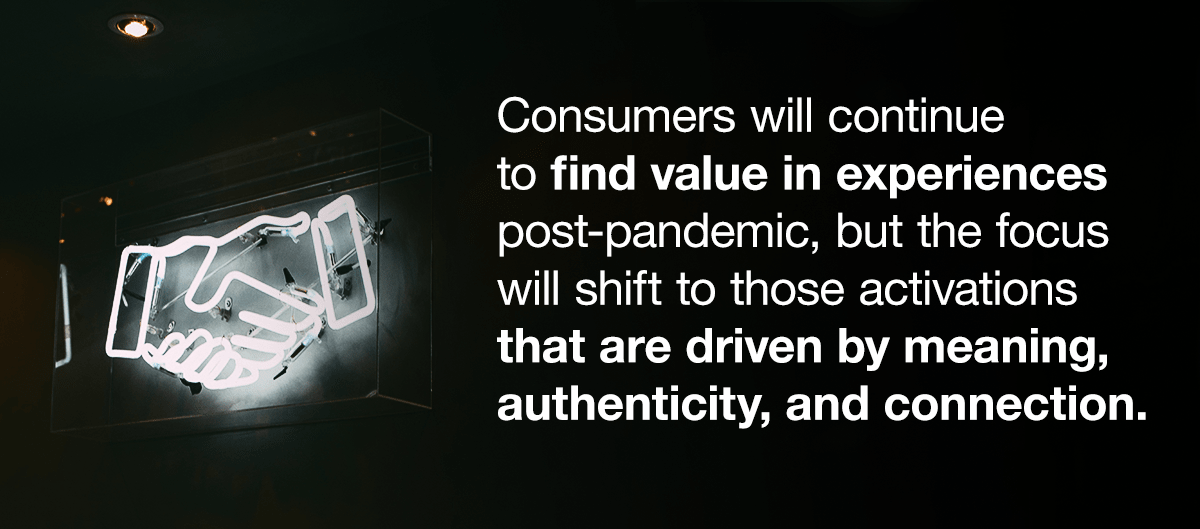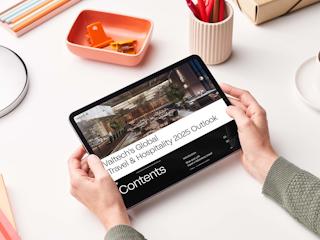Those experiences were seen as having more value than the product or service itself. Personal connections were surface-level, sometimes superficial, and often lacked authenticity. Post COVID-19, brands will see a rapid shift in the way consumers engage, and a new economy will emerge. They will need to quickly adjust to become more flexible and transparent than ever before.
Even before stay-at-home policies and social distancing, many brands were already experimenting with new technologies and service offerings, but consumers weren’t quick to adopt these new behaviors. Now they are being forced to. Grocery stores are only allowing curbside pick-up and restaurants are adjusting their business models to offer robust carryout services to keep up with consumer demands.
Although consumers won’t be forced into these behaviors forever, they will be more accustomed to them in the future, and brands will need to adjust accordingly.
Our future economy will reveal the flaws of our past, but it will also be more connected than ever before. How will this shift change future behaviour, and will your brand be ready?
There are four pillars brands must understand and uphold to succeed in the future Connected Economy:
Meaningful Experiences
Consumers will continue to find value in experiences post-pandemic, but the focus will shift to those activations that are driven by meaning, authenticity, and connection. Meanwhile, campaigns that are just looking for PR buzz or their fleeting moment on social media, will feel forced and empty. Experiences driven by true human connection and emotion will gain more loyal fans. Consumers will be looking for companies to rally around—ones that lift us up, support social causes, or simply make us laugh—and opportunities to celebrate the heroes on the frontline, reconnect with family and friends, or simply provide us with a mental health boost. Leveraging technology to provide greater access to these feel-good moments.
Brands that can provide optimism in an uncertain time will be rewarded, and they will remind us we’re all human, all connected, and have made it through this together.
Expected Convenience
With most Americans adjusting to mandatory stay-at-home guidelines, consumers are relying on services once thought to be indulgent amenities. These conveniences include same-day grocery delivery, curbside pick-up, live streaming fitness offerings, virtual doctor visits, and even direct-to-consumer movie screenings. As consumers become more accustomed to these elevated services, their expectations will shift from novel to anticipated, and brands will be expected to maintain this new range of offerings.
Retailers, restaurants, and service brands will need to continue offering flexible solutions to keep up with learned behaviours during social distancing, and that also means embracing technology. Every touchpoint of a shopping or dining journey should be frictionless. Whether it’s contactless payment, virtual consulting, or replicating grocery orders with a touch of a button, technology will be the key to expected convenience.
Responsible Social Engagement
During this time of overwhelming uncertainty, brands should be taking actionable steps to inform their consumers how they will adjust post-pandemic. As legislature continues to drive social distancing and stay-at-home policies, a realistic post-COVID-19 response will be the impulse for more human connection. Brands need to start addressing this trend now to put policies in place for more responsible social engagement following the pandemic.
 Consumers are quickly getting used to connecting with loved ones virtually and gathering in smaller groups. Brands will need to consider how they can bring their products and services to consumers while remaining socially responsible.
Consumers are quickly getting used to connecting with loved ones virtually and gathering in smaller groups. Brands will need to consider how they can bring their products and services to consumers while remaining socially responsible.
Retailers will need to consider the scale of their stores. This could mean smaller, more localized spaces in place of larger flagships. Shopping outings may become appointment-based, with a greater focus on customized service. Restaurants will need to rethink communal tables and focus on fewer touches overall, leveraging digital ordering or contactless payment. Large gathering places like shopping centres and sporting destinations will have to inherit not only a more robust process for sanitizing their facilities, but also the platform to showcase and inform customers about these new practices. “Zero touch” solutions like automatic doors, voice activation, and motion-sensor lighting will help combat sensitivities when easing back into social engagements.
Authentic Accountability
As COVID-19 developments evolved, brands began communicating with their customers about how they were handling the situation via email, advertisements, social media, and more. This deluge of communication brought with it a new standard in accountability. Consumers will lean into brands they feel are not only trustworthy but thinking about the greater good.
Purpose-led brands will set the tone, showcasing the impact of transparency and sustainability in our post-COVID world. Consumers will come out of this pandemic with not only tighter purse strings, but more importantly, a greater sense of awareness of what’s important and this will translate to the services and products they are willing to support. Brands that remain focused on being better corporate citizens will create more informed and loyal customers in the future.
It is no secret the world is experiencing a major culture shock at a rapid pace, and COVID-19 is fundamentally changing the way consumers are spending, but brands can learn from this experience. Because every demographic is being affected by social distancing, retailers have a rare opportunity to observe how their consumers are reacting to change and adapt their brand and business objectives to complement these shifts. Brands that create meaningful experiences, offer more the expected conveniences, practice responsible social engagement, and do the right thing by helping their communities will enter the Connected Economy stronger than before.











